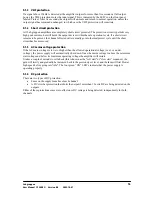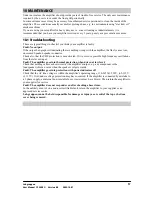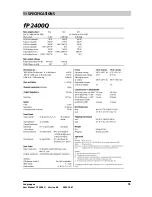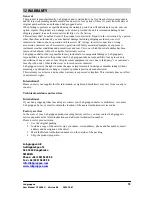
RKO= iáåâ=ëïáíÅÜ=
The Link switches located on rear panel (switches between the four XLR input connectors) are for
changing the operation mode of the amplifier. (See below, section 5.3).
RKP= léÉê~íáçå=ãçÇÉë=
RKPKN= píÉêÉç=ãçÇÉ=
In this mode, both channels operate independently of
each other. This is used for all 2 or 4-channel mo
such as stereo and bi-amping. Set the switches
depressed -OUT position for the stereo mode. The
level attenuators on the front panel will control the
respective channels levels.
des,
in
Never connect either output terminal to ground
or in parallel
. The recommended minimum nominal
impedance, for quad or tandem stereo operation, is 2
ohms per channel.
RKPKO= kçíÉ=Ñçê=ÄÉåÅÜ=íÉëí=
NOTE: Channel B and D is always polarity reversed on the input, but polarity compensated by feeding
the minus pin on the Channel B and D outputs with the output voltage. Channel A and C outputs are
connected in normal polarity mode. By having channel A and B (and C and D) operating in opposite
polarity, the energy storage in the power supply is more efficient. This is significant for signals below
100 Hz (sub bass etc.) and improves the power bandwidth.
Be sure to use balanced inputs on all
measurement equipment (also oscilloscope probes) if you are bench testing.
Reverse operation of Channel B and D.
RKPKP= q~åÇÉã=ãçÇÉ=
In tandem mode two or four channels' inputs are linked and receive the same signal. The tandem mode
is active if the Link switches are in the pressed –“IN”-position "On". All level attenuators are active,
allowing you to set different levels for each channel. Note that only the inputs are connected in parallel.
This is NOT a parallel output mode.
Never connect either output terminal to ground or in parallel.
You can use the remaining input connectors to carry signal to other amps. This is called “Daisy-
chaining”.
NOTE: Always turn off the Link switch when using the amplifier for Bi-amping.
i~ÄKÖêìééÉå== =
=
=
=
======================
========================
T
rëÉê=j~åì~ä===Ñm=OQMM=n=====sÉêëáçå=MKU========OMMPJNMJMT=






































